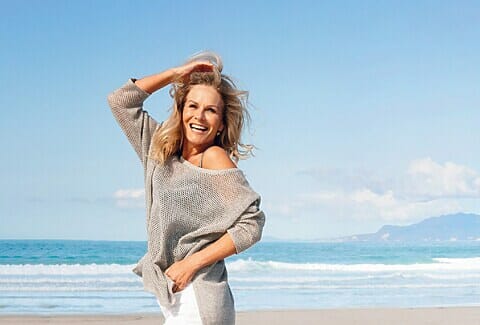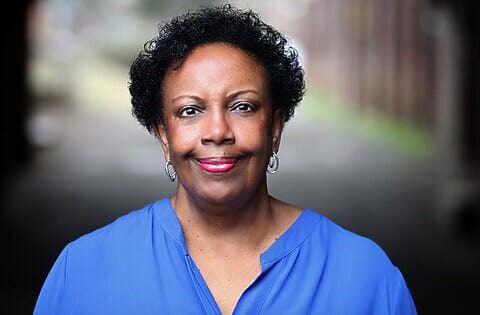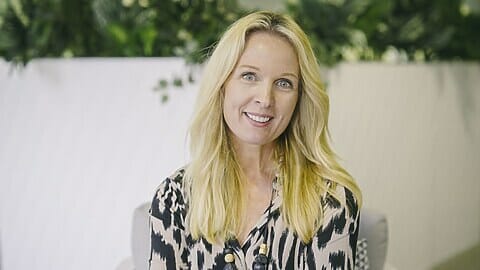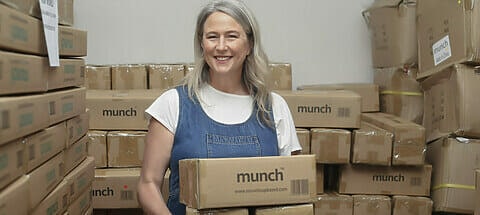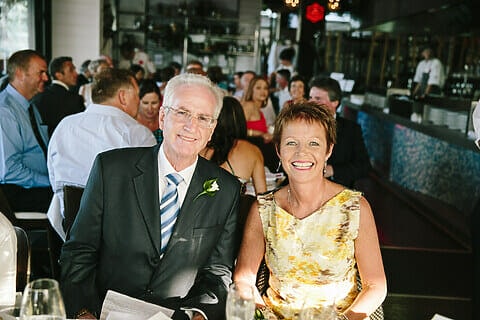Poverty, violence and drug addiction couldn’t keep Michelle Berriman down, and today she’s at the forefront of our charity sector, giving back to the community. She tells Sharon Stephenson how she rose from the ashes – and why she should probably go on MasterChef.
The first thing you notice is the hair: a shocking pink mohawk that defies both gravity and low doorways. The second is her accent: a gentle Scottish burr, full of rolling Rs.
“I’ve lived in New Zealand since 2007 but I still haven’t picked up the accent,” says Michelle Berriman, the executive director of FINZ (Fundraising Institute of New Zealand).
She might not look or sound like your average Kiwi chief executive, and the only degree she has is from the School of Hard Knocks, but 42-year-old Michelle has been credited with turning around the fortunes of the not-for-profit organisation that oversees and educates Aotearoa’s fundraisers and our fundraising sector.
“I was headhunted in 2018 when they asked if I could help save a sinking ship,” she says. “I’ve spent my whole life in the not-for-profit sector and have a huge passion for giving back to the community, so I jumped at the chance. Plus, thanks to my s*** upbringing, I bring a different perspective.”
Naturally, that perspective has had its critics. “People said, ‘I’m not sure a Scottish woman with pink hair should be running FINZ’. But that kind of thing just makes me more determined to prove them wrong. I’ve been challenging boundaries and causing disruption since I was a child.”
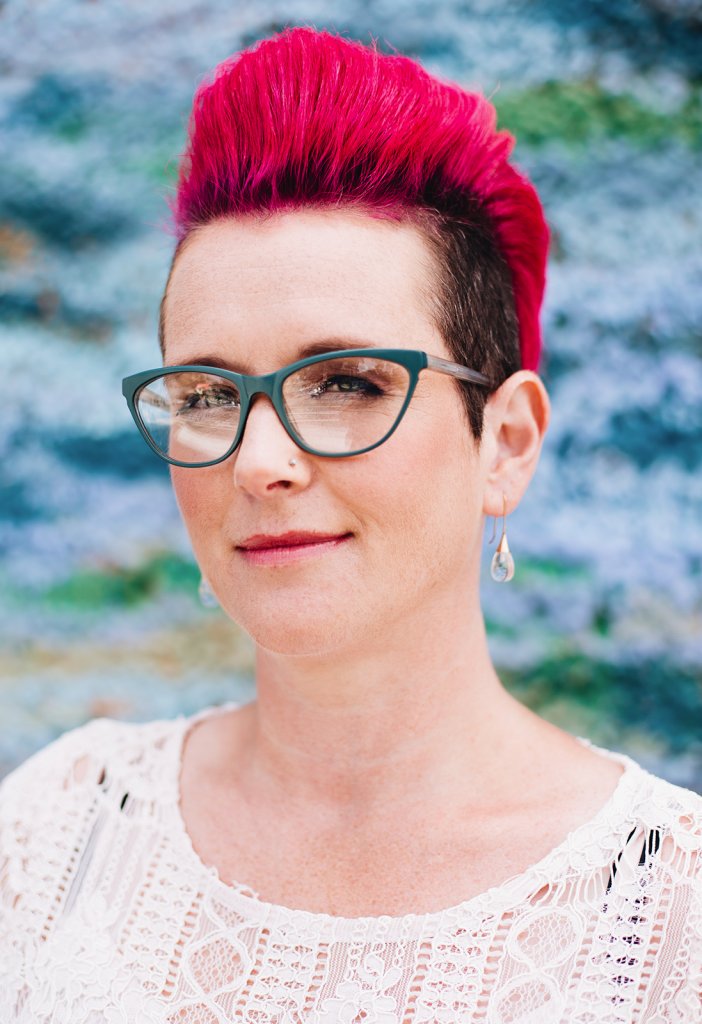
She’s not kidding: as Friday afternoon unspools, the mother of five tells me about her life, which has more than a whiff of the film Trainspotting about it. It includes, in no particular order, drugs, alcoholism, overdoses, a suicide attempt and a hugely dysfunctional upbringing. The fact that Michelle’s even here today, unlike the six friends she lost to heroin overdoses, is a testament to her sheer resilience and desire to make something of herself.
She was born Michelle Paterson in Aberdeen to working-class parents who lived in the kind of high-rise council estates you’ve probably seen on British TV shows. Her father was a promising footballer, scouted by some of the UK’s top clubs until, says Michelle, “drink got him”.
Her parents split up a few weeks after her younger sister was born and life became a conveyor belt of poverty, violence and unhappiness.
“Mum was busy with other boyfriends, so I often had to look after my little sister. There was never any food in the house and Dad used to beat up Mum’s boyfriends. I remember once getting off the bus and Mum telling me to run, because Dad was across the road with a crowbar ready to attack her boyfriend.”
Encouragement was also in short supply. “Mum would say things like, ‘You’re going to end up a waste of space like your father.’”
Michelle found salvation in gymnastics and seemed destined to win at place at the 1994 Commonwealth Games. “I trained incredibly hard from the age of five to 13, until a back injury ruined my dreams,” she says. “But it taught me that if you work really hard at something, you can achieve it.”
Michelle was academically bright and dreamed of becoming a doctor, a goal that was short-lived when she brought home pamphlets from the local university and her parents said, ‘People like us don’t go to university’. It’s probably why Michelle’s so proud of her eldest daughter (she has three daughters and two sons, aged 11 to 21), who recently graduated from Otago University with a degree in genetics and Japanese.
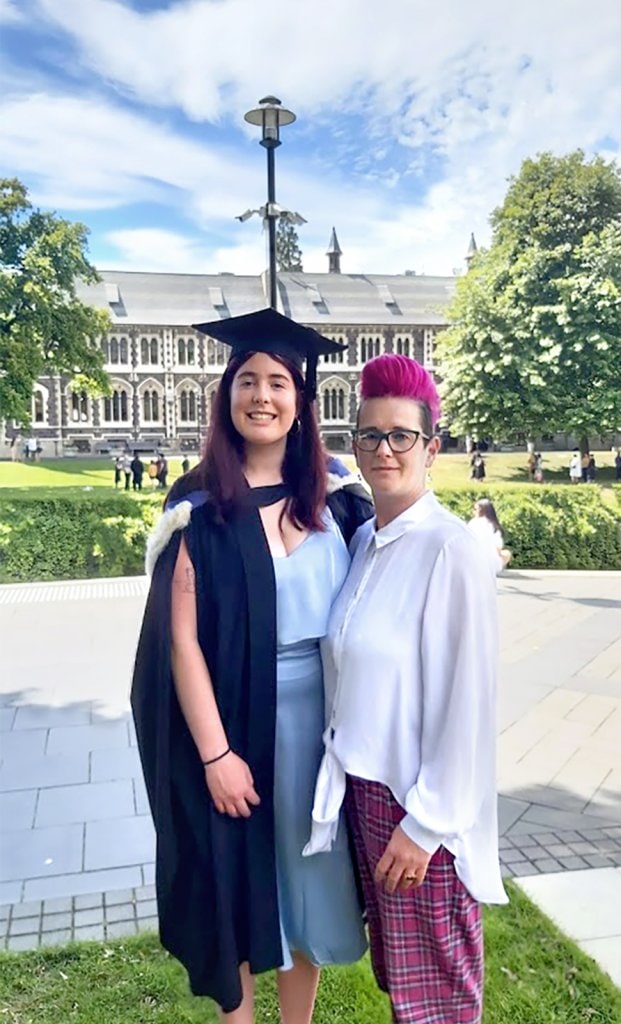
IMAGE SUPPLIED
But back to Aberdeen. Despite achieving high grades and holding down part-time jobs, drink and drugs were a constant, with Michelle trying speed at age 12. “My little sister knew how to roll a joint at four,” she says. “I got into cannabis, acid and ecstasy, and later harder drugs like heroin. Drinking and drugs were acceptable in that environment.”
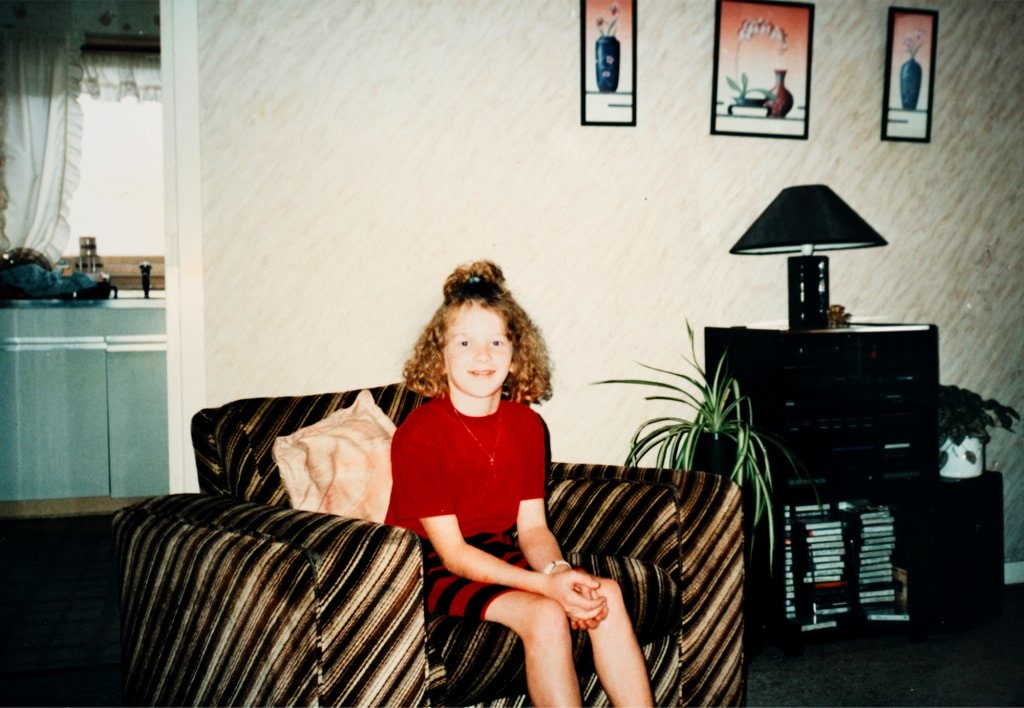
IMAGE SUPPLIED
At 14, Michelle signed herself into the care system but, tired of it all, swallowed 90 paracetamol tablets. “I was over everything,” she says. “I’d had enough.” She was raced to a hospital in an ambulance and spent a week there, having the drugs flushed out of her system and being assessed by a psychiatric team. She ended up spending six months in a foster home (“It was the first time I’d seen fresh broccoli”), before being transferred to a care home and eventually to her own flat.
Following the death of her neighbour from an overdose, Michelle reached a crossroads. “I realised I didn’t want to go down that track,” she says. “I wanted to help others.”
At first, that took the form of a buddy programme she set up to help other young people navigate life’s challenges, from changing a light bulb and paying bills to making their way in a world not always kind to them. That eventually morphed into a job with Save the Children, working with some of Glasgow’s most vulnerable children, and later into training social workers. Michelle was also the youngest person ever to be on Scotland’s Children’s Panel, which decides the fate of society’s most at-risk youth.
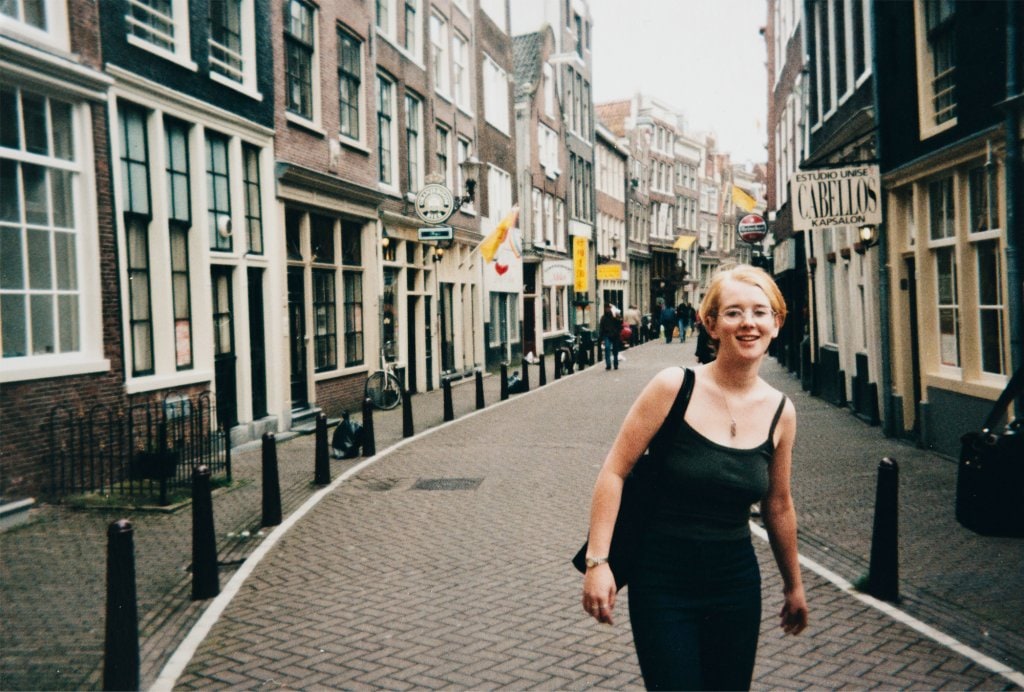
IMAGE SUPPLIED
“The level of physical and mental abuse these kids suffered was horrific,” she says. “But being able to make a difference, to take them out of those situations was hugely empowering.”
During this time, Michelle had married her first husband and had four children.
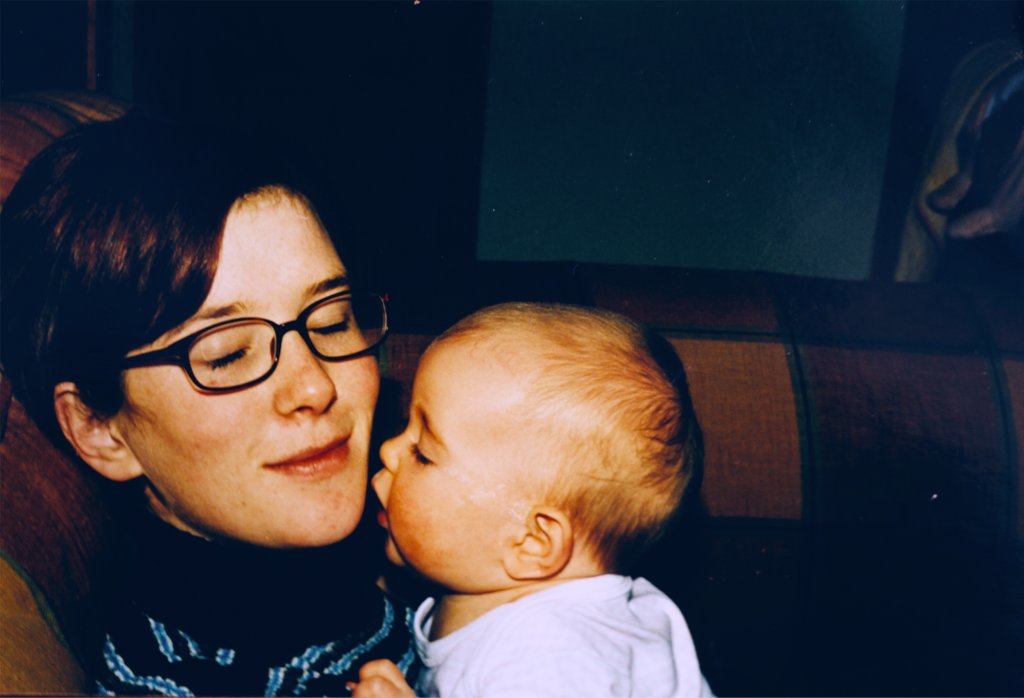
IMAGE SUPPLIED
When her partner was offered a job in New Zealand, she didn’t hesitate. “As soon as I arrived in Wellington, I felt at home,” she says. “I finally felt like I was able to breathe.”
Things were good. And then they weren’t. “My marriage had been on the rocks before we left Scotland and it ended six months later,” says Michelle. “I was bringing up four kids on my own in a new country and trying to find my feet in the charity sector.”
With her “ability to make connections and get s*** done”, Michelle did that easily, slotting into fundraising roles at Massey University and the Child Cancer Foundation. Shortly after her marriage ended, she met her Kiwi husband and the father of her youngest child. They have now been together for 13 years and married for 10, and share a rented home in Island Bay, near the sea. Although they’d love to buy a house one day, Michelle says that’s not on the cards for the foreseeable future.
“I sometimes feel like I’m letting my family down because I can’t get the 10% deposit together. I walked away from my first marriage with nothing – I just wanted to get out – so it means I don’t have as much money as I’d like. Meanwhile, house prices keep increasing.”
While it’s been a year of highs and lows for many of us, it’s been particularly rocky for the charity sector. Not being able to rattle buckets during lockdowns and an absence of disposable income thanks to Covid-related job losses has meant Michelle’s organisation has had to get creative, including co-opting global experts to run free webinars for Kiwi charities, and finding opportunities to enhance the education and training of staff and volunteers.
“In times of crisis, people usually give, and in 2019, Kiwis gave $2.4 billion – or 1.2% of our GDP – to charities, making us among the most generous givers to charity in the world,” she says. “But, like everyone, we’ve had to adapt to a changing world.”
In times of crisis, people usually give. But, like everyone, we’ve had to adapt to a changing world
It’s a nice segue into the issue that’s currently occupying Michelle’s time and headspace: the phasing out of cheques by New Zealand banks this year. It’s estimated that charities, which are heavily reliant on older donors, could lose around $1.4 billion annually.
“Some charities receive up to 90% of their income by cheque,” says Michelle. “We know it’s a done deal that cheques are going, but it has the potential to have a huge impact on communities throughout New Zealand, so we’re researching alternative methods of giving that will continue the generosity of everyday Kiwis.”
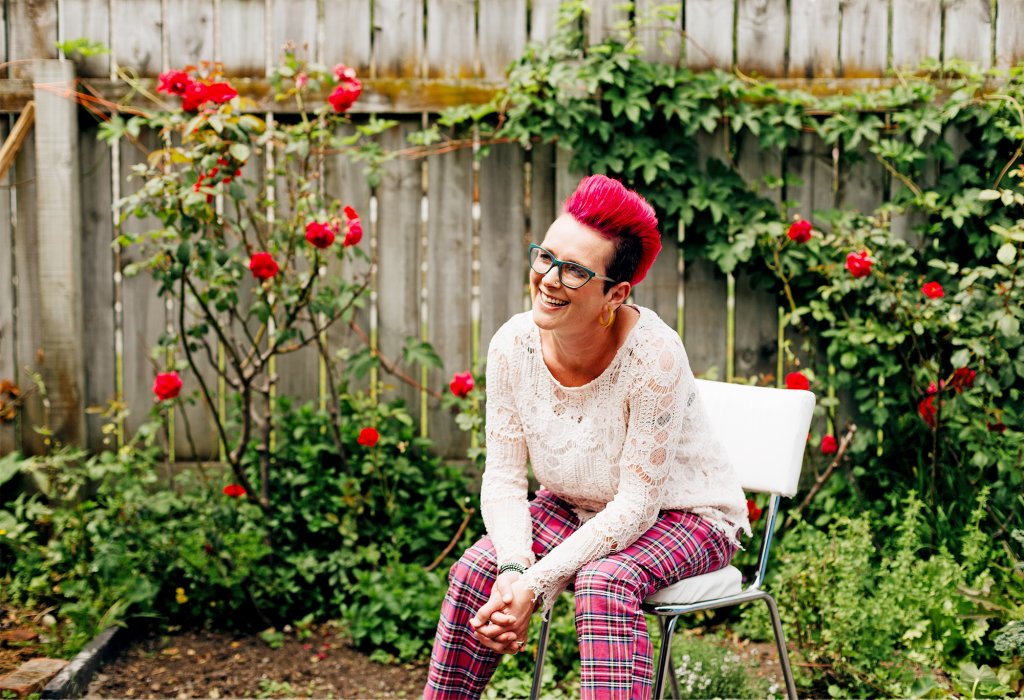
Although Michelle has struggled with mental health issues for most of her life, it wasn’t until 2011 that she was diagnosed with bipolar disorder. “Being given antidepressants when you’re not actually depressed doesn’t help,” she says. “But being able to give this a name and have appropriate medication for it has been life-changing.”
When she’s not working or spending time with her family, Michelle can be found whipping up vast amounts of delicious food in her kitchen.
“I love food and cooking, especially Asian food. Friends have often said I should go on MasterChef.”
So refined is her palate that the executive chef of a leading Wellington restaurant often asks her to critique new dishes. “Not bad for a girl who grew up on frozen peas and processed everything!” she laughs, raking her fingers through her mohawk.
Although Michelle’s professional dance card is currently full, she isn’t ruling out other opportunities to highlight important issues. “I’ve thought about going into politics because, although we’re so lucky in New Zealand compared to other parts of the world, there’s still a lot of work that has to be done, especially in terms of poverty and housing,” she says. “I’d like to use my platform to have an impact and motivate people to make a change.”
There’s no doubt the woman who’s been “fiercely independent” since she was 14 will succeed at whatever she does.
“I think I’ve made it despite my background because I worked hard to be the best at something and have never relied on anyone,” she says. “For me, it’s about making my own luck and not waiting for opportunities to come along, but creating them myself.”
If you’re struggling with depression or mental health issues and need someone to talk to, free call or text 1737 for support, or call Lifeline on 0800 543 354.


